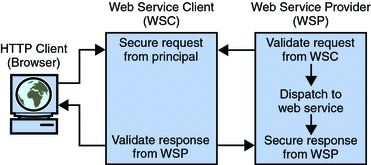JSR-196 Specification
The Java Community Process (JCP) primarily guides the development and approval of Java technical specifications, one of which is the Java Specification Request (JSR) 196. JSR 196 is a draft of the Java Authentication Service Provider Interface for Containers that defines a standard service provider interface (SPI) with which a message level security agent can be developed for Java EE containers on either the client side or the server side.
-
A server side agent can be used to verify security tokens or signatures on incoming requests and extract principal data or assertions before adding them to the client security context.
-
A client side agent can be used to add security tokens to outgoing requests, sign messages, and interact with the trusted authority to locate targeted web service providers.
The JSR–196 SPI is structured so that the security processes can be delegated to an agent at any of four interaction points (that represent the methods of the corresponding ClientAuthModule and ServerAuthModule SPI). These point are illustrated in Figure 14–2.
Figure 14–2 Four Security Process Points

When a WSC and WSP are both deployed in a Java EE web container protected by JSR–196 security agents, the initial request from the WSC is intercepted by the agent on the client side which then queries a trusted authority (for example, the Discovery Service) to retrieve the necessary authorization credentials to secure to the request. The secured request is then passed to the WSP. The agent on the provider side receives the request to validate the authorization credentials. If validation is successful, the request is exposed to the web service and a response is created using the sender's credentials and the application specific request. The response is then intercepted by the agent on the provider side to secure and return it to the WSC. Upon receiving the response, the agent on the client side validates it and dispatches it to the client browser. The JSR 196 draft specification is available at http://www.jcp.org/en/jsr/detail?id=196.
- © 2010, Oracle Corporation and/or its affiliates
